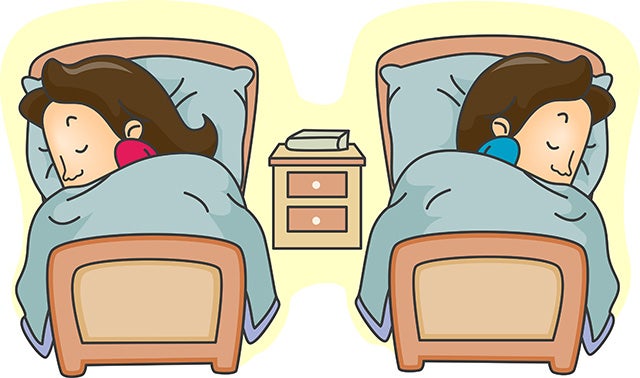You love your partner.
They’re the best thing that’s ever happened to you.
You two are best friends by day and passionate lovers once the sun begins to set…
But once nighttime rolls around, you’re frenemies at best—and mortal enemies at worst.
The snoring. The blanket hogging. The moaning in their sleep. The arm slapping across your face. It’s just too much. Your nights are not only sleepless but filled with rage and despair. And boy, does it show the next morning!
What is a Sleep Divorce?
We’ve established that you love your partner and would never think of leaving them—at least until you find yourself staring up at the ceiling at night, tempted to punch your partner awake as they engage in all manner of snoring.
But there’s a solution.
A sleep divorce. (No paperwork required.)
A sleep divorce refers to a situation where romantic partners decide to sleep separately from each other rather than sharing a bed.
This might sound a bit harsh, but come on…aren’t you already a little harsh toward your S.O. each morning? Unless you’re going to get a new mattress that’s best for couples. One that isolates motion, so you don’t feel them tossing and turning.
An increasing number of couples are choosing to sleep apart from their partner, and there are a range of potential benefits associated with sleep divorces.
You might want to read: Navigating Sleep Divorce at Bedtime
Potential Benefits of a Sleep Divorce
Opting for a sleep divorce can benefit your overall health as well as your relationship satisfaction.
— Health
Many couples report that sleeping away from their partner helps them get better sleep each night. This is critical to their health, as sleep is responsible for a range of functions that promote good health.
Getting sufficient sleep:
- allows your brain to store long-term memories.
- gives your brain the time and resources to clear out toxins.
- can improve mood and creativity.
- helps regulate a variety of essential hormones.
- allows your body to “recharge” and heal/repair itself.
Failing to get enough sleep opens the door to all kinds of health issues, from memory problems to obesity and diabetes.
— Relationship
Many couples worry that sleeping separately would do more harm than good in their relationship. Indeed, there are many factors to consider here:
- Will you hurt your partner’s feelings?
- Will they think you’re being overly dramatic?
- Will having separate sleep spaces dim your intimacy?
The good news is that, more often than not, these fears are unfounded, and relationships can flourish in the midst of a sleep divorce.
If sleeping separately allows you to sleep better, this will reduce your overall stress levels and promote positive feelings that can boost your intimacy levels.
— Stress
As mentioned earlier, getting enough sleep keeps your hormone levels where they should be.
One hormone, in particular, can wreak havoc on your mood and on your relationship: Cortisol. Often dubbed the “stress hormone,” cortisol is released into the bloodstream in situations that call for a “fight or flight response.” And, you guessed it, the brain produces more cortisol when you’re sleep-deprived.
You don’t need a marriage counselor to know that being under prolonged stress can damage your ties with others.
— Intimacy
Can a couple remain intimate while sleeping away from each other?
While this will vary from one couple to another, many have found that sleeping separately either has no effect (or even has positive effects) on their intimacy levels.
One factor here is that getting quality sleep each night is a natural way to boost your mood—you feel refreshed, your cortisol levels are no longer sky-high, and you don’t harbor resentment toward your partner each morning.
In addition, some couples find that sleeping separately encourages mor e action in the bedroom (not less). This may be due to the common fear that a sleep divorce will interfere with a couple’s sex life; in order to ensure this doesn’t happen, both partners work harder to keep the fire burning.
How Does One Get a Sleep Divorce?
If you’re ready to reap the rewards of a sleep divorce, you might be wondering how to go about this without upsetting your partner. This concern is especially valid if you struggle to fall or stay asleep more than your partner does. However, there are a few things you can do to soften the blow and ensure your sleep divorce is mutual.
Talk to your partner
The first step is to talk to your partner.
Be honest with them about your sleep troubles, what you think the cause is (e.g., snoring), and how you would like to move forward. It’s critical that you handle this conversation with respect and understanding; this might come as news to your partner to begin with, so don’t point fingers!
Make a plan together
Once you’ve laid your troubles out in the open, it’s time to have a more serious discussion with your partner.
Assuming they’re open to a sleep divorce, you should be able to work something out that benefits both of you. This might mean having two beds in your room, sleeping in separate rooms, taking turns on the couch, or any number of creative solutions your pretty little minds can conjure up.
Experiment
That brings us to the fun (and maybe not-so-fun) part: experimentation.
Oftentimes, partners who opt for a sleep divorce need some time to ease into it. If you’ve tried taking turns on the couch and it just isn’t working, try talking with your partner again to find a better solution (e.g., saving up for a second bed to put in your bedroom).
You might want to check: Romantic Bedroom Decor Ideas
Keep the romance alive
We mentioned earlier that a sleep divorce can have positive effects on the intimacy between partners. But this won’t happen all on its own! You and your partner should be intentional about keeping the romance alive throughout your sleep divorce.
Make sure physical touch still happens. Make sure sex still happens. Make sure that you and your partner are still talking, communicating, and laughing together.
This might mean finding a shared hobby for weekends or spending time in bed together before parting ways, for example. Little things count.
The Final Verdict
Though it might not be the best solution for every couple, a sleep divorce might be just the thing you need to keep your sanity (and your relationship) intact. As long as you approach the topic with patience, understanding, and respect, trying out a different sleeping arrangement could work wonders for your love life!
Now that you know the potential benefits of getting a sleep divorce, what are your thoughts?
Is this something you’d like to try with your partner? Or have you already been “sleep divorced” for a while now? We look forward to hearing from you! And be sure to check out our guide to help stop snoring if you want to try a few things before considering a sleep divorce.
Photo credit: Stock-Asso/Shutterstock; tommaso79/Shutterstock;
Everett Collection/Shutterstock; BNP Design Studio/Shutterstock;
Monkey Business Images/Shutterstock; NDAB Creativity/Shutterstock;
BlueSkyImage/Shutterstock; BearFotos/Shutterstock;
Vanoa2/Shutterstock; Dmytro Zinkevych/Shutterstock










